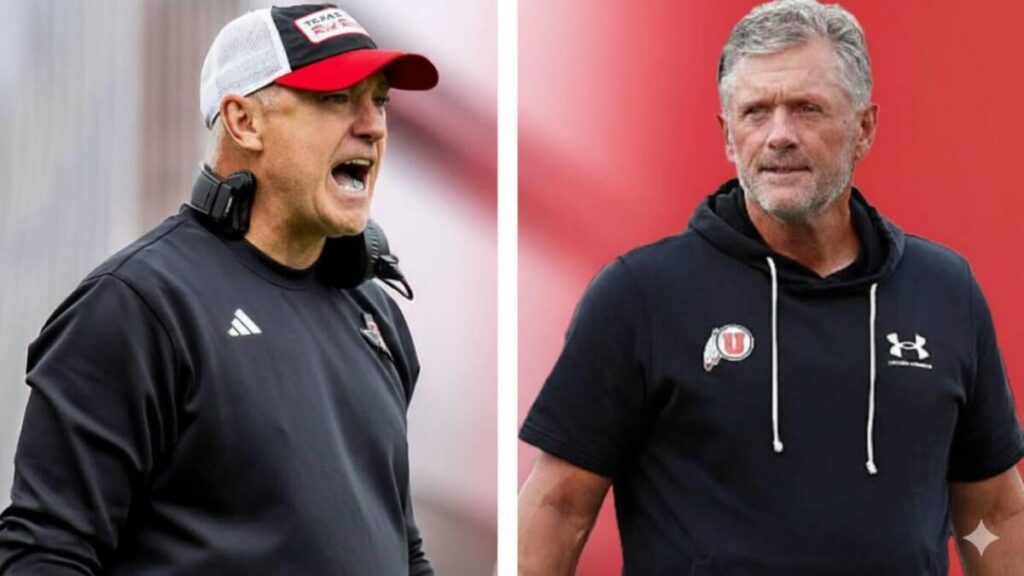When No. 16 Utah and No. 17 Texas Tech meet on Saturday at Rice-Eccles Stadium in Salt Lake City, Utah, it will be a battle of contrasts. While one program has set itself as one of the standards in college football, the other is trying to crash the party.
Utes coach Kyle Whittingham is one of the most traditional in the sport. He’s been with the program since 1994 and has been a household name for the better part of two decades. Whittingham boasts seven 10-win seasons, three conference titles and 170 career wins.
And then there’s Texas Tech, the boom town program that’s recently struck gold (or, oil). The Red Raiders are in the midst of a historic drought, failing to win 10 games since 2008. Their last outright conference championship came in 1955. It was enough that Red Raiders coach Joey McGuire and the athletic department took a huge chance over the offseason in the transfer portal to change the narrative.
On Saturday, the paths converge in one of the biggest matchups of the Big 12 season. Both expect to be in Arlington, Texas, playing for the conference championship at the end of the year. And their paths to contention could not be more different.
The Six Pack: Picks for Miami vs. Florida, Oklahoma vs. Auburn and Tom Fornelli’s lock for Week 4
Tom Fornelli
Texas Tech’s swing
In July 2024, Texas Tech billionaire booster Cody Campbell came to the table with a plan.
With no guarantee of an uncapped system headed forward, the Red Raiders would swing big in the transfer portal and reel in one of the most talented rosters in program history.
After spending several million dollars, Texas Tech’s transfer class ranked No. 2 in the nation. Ten transfers have taken over starting spots since the move, with seven of them coming on defense. Quickly, a unit that was one of the nation’s worst a year ago has ground its opponents into dust.
The greatest gains have come on the defensive line, where the Red Raiders brought in four future NFL Draft picks (David Bailey, Lee Hunter, Romello Height, Skyler Gill-Howard). So far this year, Texas Tech has allowed just 1.5 yards per carry and 41 yards per game through three matchups, trailing only BYU for best in the nation.
There’s been plenty of offensive development under first-year coordinator Mack Leftwich as well. Quarterback Behren Morton leads the nation with 11 touchdown passes and the unit as a whole is clearing 600 yards per game. Coming up through the Incarnate Word tree, Leftwich blends Air Raid principles with spread and veer-and-shoot concepts to create a truly explosive offense, one that would have felt right at home in the heyday of the Big 12.
At the helm is McGuire, a former Texas high school football coach who earned the Texas Tech job without ever calling a collegiate play. Instead, he’s a program builder and culture setter whose most important job in 2025 has been integrating the newcomers to a hungry roster.
The real tests are ahead, but the early returns have been strong.
Developmental DNA
While Texas Tech utilized the transfer portal to build in the trenches and complement its dangerous skill talent, Utah did quite the opposite. Essentially, every major player in the trenches and on defense is a homegrown recruit.
That’s not to say Utah is skimping monetarily. The word around college football is that the Utes spent handsomely to ensure its top unit returned. Already, the offensive line unit is looking like one of the best in the nation. Right tackle Spencer Fano has been a projected first round pick for months, and left tackle Caleb Lomu is rising quickly. The interior boasts three redshirt seniors, with left guard Tanoa Togiai emerging as a star.
The same is true on defense, where the Utes returned 10 starters from last year. Defensive ends Logan Fano and John Henry Daley both started their careers at rival BYU, but the players joined the program before 2024. Utah sets its watch to defensive development, and the unit — led by linebacker Landon Barton — should again be one of the best.
However, it’s the skill positions where Utah really went big. The Utes hired offensive coordinator Jason Beck from New Mexico, and he imported the best of the Lobos. Quarterback Devon Dampier and receiver Ryan Davis lead the team, while running back NaQuari Rogers joins Wazzu transfer Wayshawn Parker as big-time contributors.
College football has featured several offensive imports over the years that struck it big, including Eric Morris bringing future No. 1 overall pick Cam Ward to Washington State. With the trench foundation that Whittingham brings to the table, it has made Beck’s offense that much more dangerous.
Best on best
Utah is the established power. Texas Tech is the renegade newcomer. Both facets will be put to the test in one of the most important conference games of the early season.
All eyes will be on the matchup in the trenches, especially when Utah’s offensive line goes against Texas Tech’s defensive unit. If Texas Tech edge rusher David Bailey lines up against right tackle Spencer Fano, it will provide a preview of NFL Sundays. Both could be first-round picks.
And furthermore, Utah’s offense runs out of the spread option. It thrives by convincing defenders to overpursue. Texas Tech’s success in this game won’t rely on talent up front. Instead, it will require discipline. It’s a perfect prove-it spot for defensive coordinator Shiel Wood’s team.
Adding intrigue to this game, neither team has been tested to this point. The two teams’ opponents are a combined 1-11 against FBS competition, and Utah’s top opponent — UCLA — has already fired its coach. This is the first moment where we see the limitless potential of these teams stress tested.
Expectations are off the charts at both schools. Only one can emerge victorious.
Read the full article here



